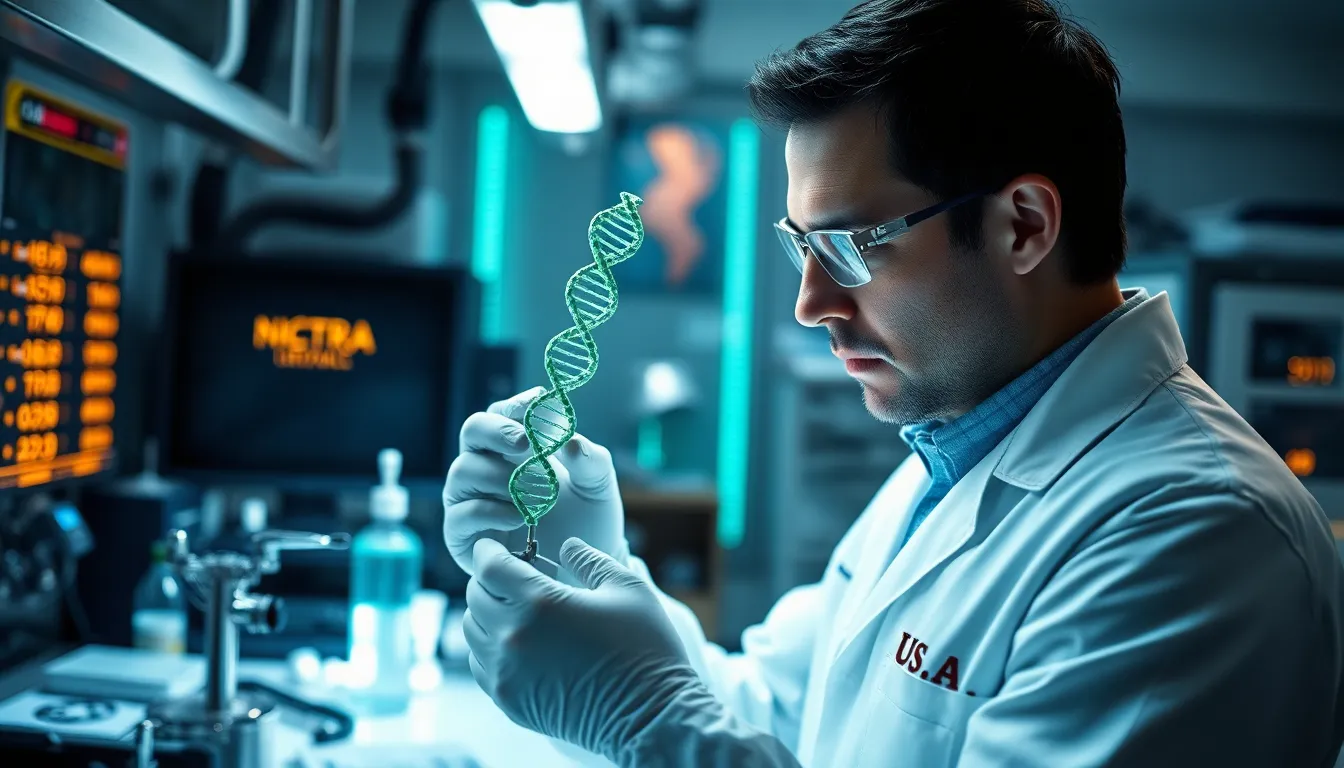Table of Contents
ToggleBiotechnology stands at the forefront of scientific innovation, promising to reshape industries and improve lives. As advancements in genetic engineering, synthetic biology, and bioinformatics accelerate, the potential applications seem limitless. From revolutionizing healthcare with personalized medicine to addressing food security through enhanced agricultural practices, biotechnology is paving the way for a sustainable future.
The next decade will be crucial as researchers and companies harness these technologies to tackle pressing global challenges. With the convergence of artificial intelligence and biotechnology, the landscape is evolving rapidly, offering new solutions that were once thought impossible. Understanding the future of biotechnology is essential for anyone interested in the intersection of science, ethics, and society.
Overview Of Biotechnology Future
Biotechnology’s future offers significant potential across various sectors, including healthcare, agriculture, and environmental sustainability. It is anticipated that innovations in genetic engineering enable precise treatments for genetic disorders. These advancements can lead to safer therapies and increased patient access to personalized medicine.
Key trends shaping biotechnology include the rising integration of artificial intelligence. AI improves drug discovery processes, accelerates research timelines, and enhances data analysis efficiency. Companies adopting AI technologies gain a competitive edge by optimizing experimental designs and predicting therapeutic outcomes.
Synthetic biology stands as another important area. It aims to redesign organisms for specific purposes, improving crop yields and developing sustainable biofuels. The growth of synthetic organisms can alleviate issues related to food security and reliance on fossil fuels.
Bioinformatics plays a crucial role in the future of biotechnology. It uses computational tools to analyze biological data, facilitating the identification of biomarkers and enabling rapid responses to health crises. This integration enhances predictive diagnostics and personalized treatment plans.
Moreover, regulatory frameworks continue to evolve. Governments and organizations are establishing guidelines that balance innovation with safety and ethical considerations. This adaptability ensures biotechnology remains aligned with public interest and societal values.
Investment in biotechnology is increasing, with venture capital flowing into startups focused on groundbreaking solutions. These investments fuel research and development, leading to noteworthy breakthroughs and a vibrant ecosystem.
Continued collaboration among academia, industry, and government is essential. Partnerships enhance knowledge sharing and resource allocation, propelling advancements in field applications. Networking among stakeholders creates avenues for innovation and addresses pressing global challenges.
Biotechnology’s future focuses on enhancing quality of life and addressing critical needs. As breakthroughs emerge, they hold the promise of transformative solutions with far-reaching impacts. Understanding these developments will shape approaches toward ethical, societal, and scientific implications.
Emerging Technologies In Biotechnology

Emerging technologies in biotechnology are set to redefine possibilities across numerous sectors, enhancing health, agriculture, and sustainable practices. Key innovations such as gene editing and synthetic biology are at the forefront of these advancements.
Gene Editing Innovations
Gene editing technologies, particularly CRISPR-Cas9, enable precise modifications in DNA sequences. These tools facilitate targeted treatments for genetic disorders, potentially correcting mutations responsible for diseases like cystic fibrosis and sickle cell anemia. Research published in Nature highlighted CRISPR’s ability to efficiently edit genes in various organisms, allowing for rapid advancements in therapeutic applications. Recently, innovative approaches like prime editing show promise for safer editing with fewer off-target effects. Continued advancements may lead to widespread implementation in personalized medicine, improving patient outcomes and enhancing the efficacy of treatments.
Synthetic Biology Advances
Synthetic biology represents a paradigm shift by designing and constructing new biological parts, devices, and systems. The ability to engineer organisms for specific tasks leads to significant breakthroughs in agriculture, such as developing drought-resistant crops and increasing nutrient content. According to a report from the World Economic Forum, synthetic biology could produce sustainable biofuels, reducing carbon emissions and reliance on fossil fuels. Moreover, advancements in this field pave the way for bio-manufacturing solutions that utilize renewable resources for producing chemicals and materials, showcasing the potential for sustainable practices in various industries.
Impact On Healthcare
Biotechnology significantly influences healthcare, shaping the development of treatments and enhancing disease management through innovative technologies. Advancements in various areas lead to improved patient outcomes and overall public health.
Personalized Medicine Developments
Personalized medicine leverages genetic information to tailor treatments based on individual patient profiles. Companies increasingly utilize genomic data, allowing for targeted therapies that address specific genetic mutations. Innovations like CAR-T cell therapy enhance the immune system’s ability to fight cancer, while comprehensive genomic sequencing identifies actionable mutations in conditions like breast cancer. These advancements contribute to more effective treatment plans, reducing adverse effects, and increasing dosage accuracy.
Vaccine Technology Progress
Biotechnology plays a crucial role in advancing vaccine technology, especially in response to emerging infectious diseases. The rapid development of mRNA vaccines for COVID-19 exemplifies this progress, showcasing the potential for faster vaccine creation without compromising safety. Next-generation vaccines utilizing viral vectors enhance immune responses, offering promising solutions for diseases like Zika and Ebola. Continued research focuses on universal vaccines that protect against multiple strains, potentially eradicating diseases and promoting global health security.
Agricultural Biotechnology
Agricultural biotechnology plays a crucial role in enhancing food production and sustainability. It focuses on developing innovative solutions to meet the growing demands of the global population while addressing environmental challenges.
Sustainable Farming Solutions
Sustainable farming solutions leverage biotechnological advancements to optimize agricultural practices. Genetically modified organisms (GMOs) improve crop yields and reduce the reliance on chemical pesticides and fertilizers. For instance, Bt cotton and Bt corn are engineered to produce their own pest resistance, decreasing the need for synthetic insecticides. Additionally, biofortified crops, such as Golden Rice, enrich nutritional quality and combat malnutrition in vulnerable populations. Biotechnology enables precision agriculture technologies, such as GPS-guided machinery and remote sensing, enhancing resource efficiency and minimizing waste.
Crop Disease Resistance
Crop disease resistance is vital for ensuring food security amid climate change and emerging pathogens. Biotechnological methods facilitate the development of resistant crop varieties through genetic modification and gene editing techniques. For example, researchers use CRISPR-Cas9 to enhance disease resistance in crops like wheat and soybeans by targeting specific genes associated with susceptibility. These advanced breeding methods accelerate the development of varieties that withstand diseases, reducing crop loss and improving farmers’ livelihoods. Furthermore, biotechnology promotes the use of beneficial microorganisms as biopesticides, offering sustainable alternatives to chemical treatments.
Environmental Applications
Biotechnology offers innovative solutions for environmental challenges, particularly through bioremediation techniques and waste management innovations. These applications address pollution, improve ecosystem health, and promote sustainable practices.
Bioremediation Techniques
Bioremediation techniques utilize microorganisms to degrade contaminants in the environment. Microbial solutions enhance the breakdown of hydrocarbons in oil spills, facilitating faster clean-up and ecosystem recovery. Specific microbes, such as Pseudomonas and Mycobacterium species, exhibit natural abilities to metabolize toxic substances. Phytoremediation, involving plants to absorb heavy metals from soil, represents another effective method. Examples include using sunflowers and poplar trees to extract lead and arsenic from contaminated sites, ultimately restoring land for safe use.
Waste Management Innovations
Waste management innovations leverage biotechnology to transform waste into valuable resources. Anaerobic digestion processes convert organic waste into biogas, providing renewable energy while reducing landfill dependency. Anaerobic digesters can manage food waste from households and industries, producing methane for energy. Bioplastics derived from renewable biomass, such as corn or sugarcane, reduce reliance on fossil fuels and decrease plastic pollution. Techniques like enzyme-based composting accelerate organic matter breakdown, offering efficient recycling of biodegradable waste. Adopting these biotechnological approaches fosters a circular economy, minimizing environmental impact and enhancing sustainability.
The future of biotechnology holds immense promise for transforming various sectors and improving quality of life. As innovations in genetic engineering and synthetic biology emerge, they pave the way for breakthroughs in healthcare and agriculture. The integration of AI is set to enhance research capabilities and accelerate the development of personalized medicine.
With a focus on sustainability and environmental impact, biotechnology is poised to address global challenges effectively. Continued collaboration among stakeholders will be crucial in navigating the ethical and societal implications of these advancements. As the field evolves, it will undoubtedly play a critical role in shaping a healthier and more sustainable world for future generations.







